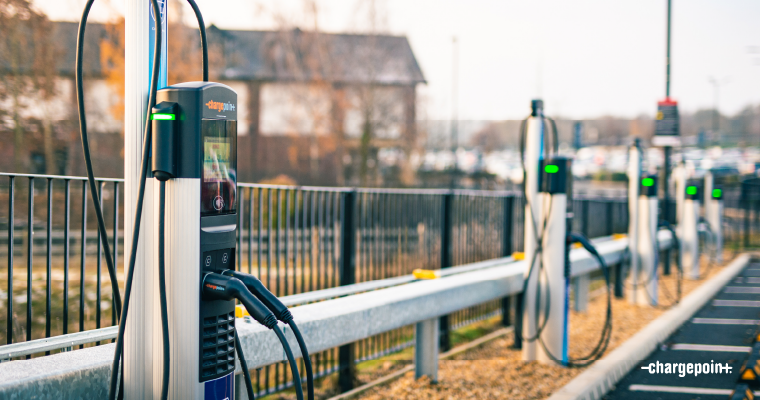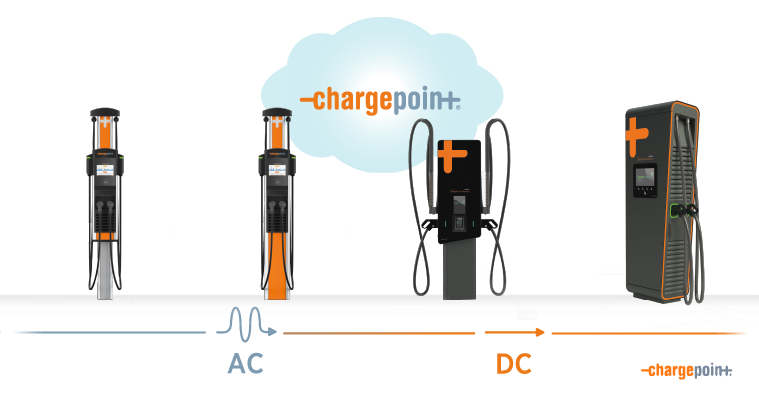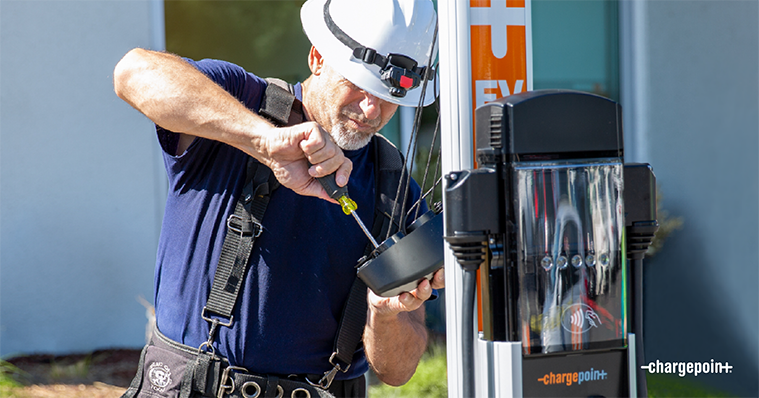
As a commercial real estate investor, you may be hesitating to implement EV charging infrastructure for any number of reasons. However, the reality is that EVs are here to stay, and the sooner you can join the e-mobility movement, the better your property assets will be positioned to grow in value and draw in top tenants. Energy research firm BloombergNEF predicts that global EV sales will continue to surge over the next few years, rising from 10.5 million in 2022 to approximately 27 million in 2026. That’s a lot of EV drivers who will need a place to plug in and charge up.
In this nascent industry, certain misconceptions might make it seem challenging to leap into offering EV charging at your properties. Strategic planning and knowledgeable industry partners can help make the transition much easier — and ultimately beneficial to your business. Let’s look at a few of these perceived challenges and the existing solutions to them.

1. Infrastructure costs and installation
Challenge: Setting up your commercial properties for an EV charging implementation may sound like a complicated and costly endeavor. New developments in most regions require strict compliance with local environmental and building regulations. Revamping older buildings can be a complex process involving electrical upgrades and permitting.
Solution: Strategic planning and site design are key to a cost-effective EV charging implementation. Start by conducting a thorough needs assessment and creating a budget for the implementation. Explore available incentives and grants in your region to offset initial installation costs. Consider partnering with an experienced EV infrastructure provider who can guide you through the process, handle installation and ensure compliance with all regulations. Setting up a subscription service for your EV charging implementation can allow you to avoid a large capital expense and instead count on a stable monthly operating expense that includes hardware, software and ongoing maintenance and support.
2. Determining the right charging mix
Challenge: AC, DC, Level 2, Level 3 — the options for EV charging stations are numerous. It may be confusing, but it’s critical that you choose the right mix of stations to meet your business and tenant needs. But where to begin?

Solution: Survey your existing tenants to understand their EV charging needs — for example, how do they prioritise charging speed, charging features, convenience and price? Build out any new charging infrastructure to accommodate long-term or overnight parking for workplace or multifamily tenants (Level 2 AC charging) as well as short-term parking for your tenants’ visitors (DC rapid chargers). Set yourself up from the start with infrastructure that will allow you to scale as your tenants’ needs change and your own business needs evolve.
3. Billing and payment
Challenge: Billing tenants for EV charging services may seem less than straightforward, especially if you have multiple tenants sharing the same charging infrastructure. You’ll need a way to track energy, understand usage behaviour, and ensure fair and accurate billing across the board. Without proper billing systems in place, disputes may arise and impact tenant satisfaction.
Solution: Invest in a robust billing and payment platform that can accurately track energy consumption for each tenant. Implement transparent and fair billing practices and clearly communicate the pricing structure to tenants. Consider options like pay-per-use or subscription models to simplify billing and payment processes.
4. Maintenance and support
Challenge: Maintenance and support can make or break tenants' trust in your EV network. Technical issues and inoperable stations will create frustration and can negatively impact the overall perceived value of your charging offering. Troubleshooting station issues may also be daunting to your staff who are not skilled in this area.

Solution: Maintaining and supporting reliable EV charging stations is essential for building strong tenant relationships. Partner with an EV charging network provider that offers comprehensive monitoring, maintenance and support services, including a warranty plan for guaranteed reliability. Ensure that tenants also have access to a 24/7 driver support hotline for immediate assistance in case of issues.
5. Future-proofing your infrastructure
Challenge: The EV industry is rapidly evolving, with new charging standards and technologies emerging regularly. Failing to future-proof your charging infrastructure can lead to obsolescence and the need for costly upgrades.
Solution: Plan for scalability and flexibility in your charging infrastructure. Invest in a solution that can receive remote firmware updates to accommodate new technologies. Install modular hardware that is easy to maintain and upgrade as standards evolve. Stay informed about industry developments and regulatory changes to adapt your infrastructure accordingly.
Power up your property with ChargePoint
Strategic planning and collaborative partnerships are key to avoiding these and any other pitfalls as you begin your EV charging journey. ChargePoint works with property investors, owners and operators to ensure a successful EV charging implementation every step of the way:
- Site design. Get expert advice on site design, based on organisational and employee needs.
- Incentives. Receive guidance finding federal, state and local incentives to help pay for the implementation.
- Installation. Connect with local, ChargePoint-certified contractors who can work quickly to get necessary infrastructure installed.
- Support. Count on proactive monitoring and maintenance as well as 24/7 driver support, freeing up your staff to focus on what they do best.

